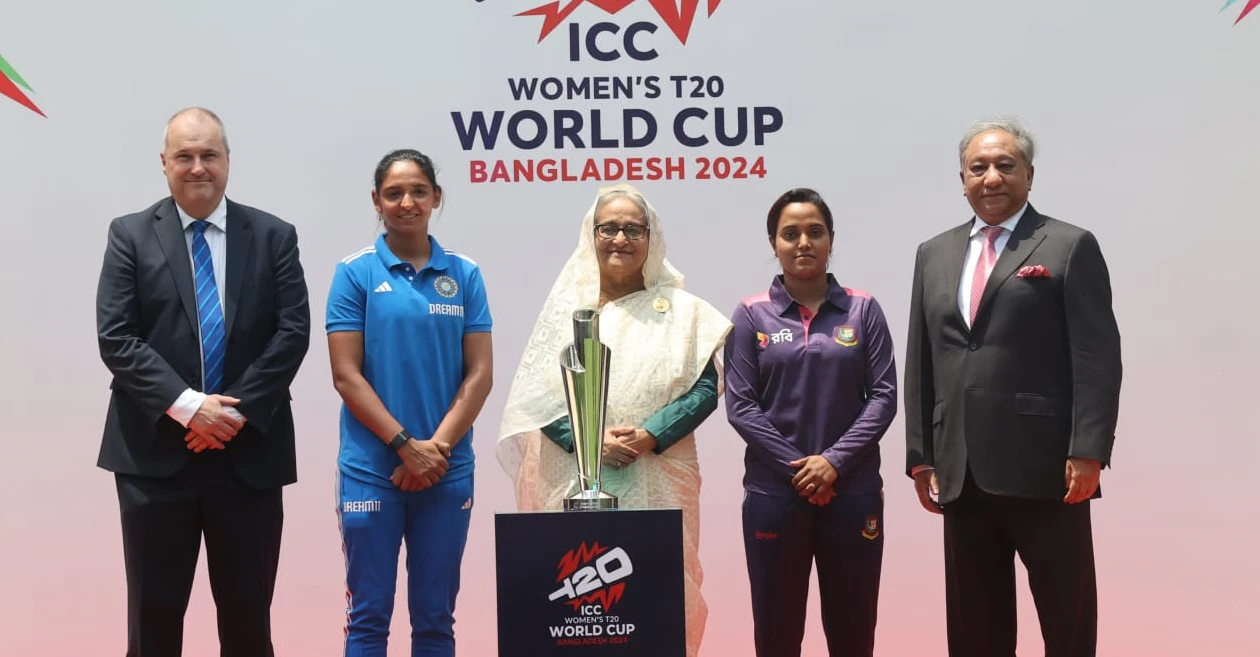In a significant development in the world of cricket, the Board of Control for Cricket in India (BCCI) has officially turned down the International Cricket Council’s (ICC) request to host the upcoming Women’s T20 World Cup, scheduled for October 2024. This decision comes against the backdrop of ongoing political unrest and security concerns in Bangladesh, which was initially chosen as the host nation for the tournament. The BCCI’s decision has sent ripples across the cricketing community, raising questions about the future of the Women’s T20 World Cup and the ICC’s contingency plans.
BCCI’s Stance: A Firm “No” to Hosting the World Cup
Jay Shah’s Candid Response
The BCCI’s Secretary, Jay Shah, recently confirmed the board’s decision to decline the ICC’s request to host the Women’s T20 World Cup. In an interaction with The Times of India, Shah made it clear that India is not in a position to take over the hosting duties for the prestigious tournament. “They [ICC] have asked us if we would conduct the World Cup. I have categorically said no,” Shah stated. His remarks highlight a firm stance from the BCCI, which has its own reasons for stepping back from the opportunity.
Monsoon Concerns and Scheduling Conflicts
One of the primary reasons cited by Shah for declining the ICC’s request is the timing of the tournament. October is typically a monsoon season in many parts of India, which could lead to logistical challenges and potential disruptions to the matches. Shah expressed concerns that the weather conditions during this period might not be conducive to hosting a successful international event like the Women’s T20 World Cup.
Furthermore, India is slated to host the Women’s ODI World Cup in 2025, which would mean hosting two consecutive major ICC events. Shah emphasized that he did not want to give the impression that India is monopolizing the hosting of World Cups, which could lead to scheduling and logistical challenges.
Security Concerns in Bangladesh: A Growing Worry
Political Unrest and Safety Risks
The ICC’s initial decision to approach the BCCI came in light of the escalating political unrest and security concerns in Bangladesh, the designated host for the 2024 Women’s T20 World Cup. The political climate in Bangladesh has raised alarms regarding the safety and security of players, officials, and fans attending the tournament. This unrest has prompted the ICC to explore alternative hosting arrangements to ensure the safety of all participants.
The ICC’s Dilemma
The ICC now faces the challenging task of finding a new host nation for the Women’s T20 World Cup, with limited time to make arrangements. The security situation in Bangladesh remains uncertain, and the ICC must weigh the risks carefully before making a final decision. The rejection from the BCCI adds another layer of complexity to the situation, leaving the ICC with fewer options and a ticking clock.
BCCI’s Future Plans: Focus on Domestic Commitments
Preparations for the ODI Women’s World Cup 2025
Despite declining to host the Women’s T20 World Cup, the BCCI remains committed to its plans for the upcoming Women’s ODI World Cup in 2025. India is already gearing up to host this event, and the BCCI is focused on ensuring that the tournament is a resounding success. By concentrating on this single event, the BCCI aims to deliver a world-class experience for players and fans alike, without the added pressure of hosting back-to-back World Cups.
Development of National Cricket Academy (NCA)
In addition to its commitment to the Women’s ODI World Cup, the BCCI is also investing in the future of Indian cricket through the development of a new state-of-the-art National Cricket Academy (NCA) on the outskirts of Bengaluru. This facility is expected to be a hub for cricketing talent and will be available to Olympic athletes as well. The NCA is part of the BCCI’s broader vision to enhance cricket infrastructure in India and provide world-class training facilities for its athletes.
The End of Pink-Ball Tests?
Concerns Over Financial Losses
In another key announcement, Jay Shah ruled out the possibility of hosting pink-ball Tests in the upcoming season. The BCCI had previously experimented with day-night Test matches using the pink ball, which was intended to attract larger crowds and television viewership. However, Shah cited concerns over financial losses for both spectators and broadcasters due to the shorter duration of these matches. The decision signals a shift in the BCCI’s strategy, as it looks to prioritize traditional red-ball Test matches, which have a longer duration and are more commercially viable.
Implications for the Future of Test Cricket
The BCCI’s decision to move away from pink-ball Tests raises questions about the future of day-night cricket in India. While the format has been successful in other countries, the BCCI’s reservations about its financial viability suggest that the experiment may not continue in the near future. This decision will likely influence how other cricket boards approach the format, particularly in countries where cricket is a major commercial enterprise.
ICC’s Next Steps: Exploring New Hosts
Identifying Alternative Hosts
With the BCCI’s refusal to host the Women’s T20 World Cup, the ICC must now turn its attention to finding an alternative host nation. The clock is ticking, and the ICC will need to act quickly to identify a country that can provide the necessary infrastructure, security, and logistical support for the tournament. Potential candidates could include countries like Australia, England, or New Zealand, which have a strong track record of hosting international cricket events.
Ensuring Player Safety and Tournament Success
As the ICC evaluates its options, the safety and security of players will be paramount. The organization will need to work closely with the chosen host nation to ensure that all necessary precautions are taken to protect the participants and ensure a successful tournament. The ICC’s reputation is on the line, and the decision they make will have far-reaching implications for the future of women’s cricket.
BCCI’s Decision and Its Broader Impact
Prioritizing National Interests
The BCCI’s decision to decline the ICC’s request to host the Women’s T20 World Cup reflects the board’s focus on its own national interests and commitments. By prioritizing the Women’s ODI World Cup in 2025 and investing in the development of the NCA, the BCCI is ensuring that it can deliver on its promises without overextending itself.
A Critical Moment for Women’s Cricket
The situation surrounding the Women’s T20 World Cup is a critical moment for women’s cricket. The ICC’s ability to navigate this challenge and find a suitable host will be a test of its leadership and organizational capabilities. For the players, coaches, and fans, the hope is that the tournament will go ahead as planned, providing a platform for the world’s best female cricketers to showcase their talents on the global stage.
As the situation continues to evolve, the cricketing world will be watching closely to see how the ICC and the BCCI manage these challenges and what the future holds for international women’s cricket.
Related posts:
 T20 World Cup 2024, ENG vs SA: Probable XI & Players to watch out for | England vs South Africa
T20 World Cup 2024, ENG vs SA: Probable XI & Players to watch out for | England vs South Africa
 Parimatch Bet: Your Ultimate Guide to Online Betting Strategies
Parimatch Bet: Your Ultimate Guide to Online Betting Strategies
 X Bet: Your Ultimate Guide to Online Sports Betting
X Bet: Your Ultimate Guide to Online Sports Betting
 Cricket Betting Sites: The Top Platforms for Online Wagering
Cricket Betting Sites: The Top Platforms for Online Wagering
 Legal Betting Apps in India: Top Picks for Online Betting Platforms
Legal Betting Apps in India: Top Picks for Online Betting Platforms
 Bet XXX: A Beginner’s Guide to Online Sports Betting
Bet XXX: A Beginner’s Guide to Online Sports Betting
 Horse Racing Betting: Tips and Strategies for Winning Wagers
Horse Racing Betting: Tips and Strategies for Winning Wagers
 BetOnline Betting: Your Ultimate Guide to Online Sports Betting
BetOnline Betting: Your Ultimate Guide to Online Sports Betting
 T20 World Cup 2024 : Rohit Sharma powerfully thrashes Mitchell Starc in a 29-run over during AUS vs IND game
T20 World Cup 2024 : Rohit Sharma powerfully thrashes Mitchell Starc in a 29-run over during AUS vs IND game
 SL vs IND: Rohit Sharma, Virat Kohli to skip upcoming ODIs, Hardik Pandya or KL Rahul to lead Team India
SL vs IND: Rohit Sharma, Virat Kohli to skip upcoming ODIs, Hardik Pandya or KL Rahul to lead Team India
 Suryakumar Yadav’s latest Instagram story sparks speculation amid T20I captaincy rumours
Suryakumar Yadav’s latest Instagram story sparks speculation amid T20I captaincy rumours
 Indian players trust Suryakumar Yadav more than Hardik Pandya, BCCI got feedback. MI dressing room chaos added fuel
Indian players trust Suryakumar Yadav more than Hardik Pandya, BCCI got feedback. MI dressing room chaos added fuel
 India vs Sri Lanka Live Streaming 1st ODI Live Telecast: When And Where To Watch Match Live
India vs Sri Lanka Live Streaming 1st ODI Live Telecast: When And Where To Watch Match Live
 Rohit Sharma ‘disappointed’ as Team India fails to score 1 run from 14 balls in 1st ODI against Sri Lanka
Rohit Sharma ‘disappointed’ as Team India fails to score 1 run from 14 balls in 1st ODI against Sri Lanka
 Kyle Mayers hits an unbelievable no-look six in the Global T20 Canada 2024
Kyle Mayers hits an unbelievable no-look six in the Global T20 Canada 2024
